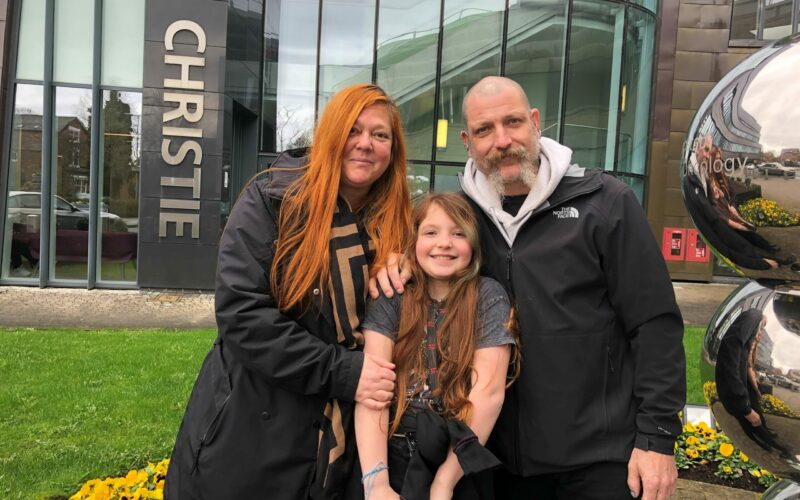Wednesday 5 April 2023
A new type of cancer therapy described by medics as a ‘marvel of genetic engineering’ is showing promising results in an early clinical trial.
Last summer doctors gave Gabriel Perez Carol (47), from Levenshulme in Manchester, six months to live. He has now become one of the first people in the UK to receive a new cancer-killing virus to treat advanced (stage 4) stomach cancer at The Christie NHS Foundation Trust in Manchester.
The innovative new treatment uses a common virus to infect and destroy harmful tumours. It involves injecting a trial drug called RP2, a weakened and modified version of the virus that causes cold sores (herpes simplex), directly into the patients’ tumours to kill the cancer.
Targeting the tumours in Gabriel’s liver, where his cancer has spread to, the virus helps his immune system fight his cancer. Gabriel is being given the ‘oncolytic virus’ injections, under local anaesthetic, once every two weeks. The procedure, similar to the technique used for a biopsy, takes around 20 minutes. Ultrasound is used to find the lesions in his liver that are then injected with the virus.
The virus attacks cancer in two ways – by invading the cancerous cells and making them burst, and by activating the immune system.
After 10 weeks of injections, Gabriel will be given an immunotherapy drug called nivolumab through a drip.
Gabriel, who is married to Lidia, and has a 9-year-old daughter Xiana (pronounced she-ana), is a construction worker, originally from Barcelona. Gabriel was diagnosed in April 2021 with stage 3 oesophagus cancer after initially taking medication for what was believed to be indigestion for 18 months. An endoscopy (camera put down the throat) identified a tumour the size of a tennis ball. He was immediately put on a course of chemotherapy to reduce the size of the tumour in preparation for surgery. When cancer was also discovered in the opening of the stomach, just a week before the operation, doctors made the difficult decision to remove Gabriel’s stomach and he underwent a total gastrectomy.
Unfortunately last summer Gabriel started to experience a pain in his side and doctors discovered the cancer had spread to his liver and he was diagnosed with stage 4 stomach cancer with the devasting prognosis of just six months without treatment.
With no option left apart from end-of-life care, Gabriel asked about clinical trials, and in March 2023 he was found to be eligible for the RP2-001-18part 2b study at leading cancer centre, The Christie. he is first person in the world with gastric (stomach) cancer to be on this specific trial.
Currently only 16 people worldwide have so far been given the treatment as part of the phase I (early phase) RP2 clinical trial. The Part 2b study plans to recruit a total of 30 patients worldwide, 24 of whom will have solid tumours.
After each treatment Gabriel will stay overnight at the National Institute for Health and Care Research (NIHR) Manchester Clinical Research Facility (CRF) at The Christie.
Preliminary findings from this study showed that three out of nine patients given RP2 saw their tumours shrink.
“ ” “ ”
Dr Sara Valpione, Consultant Oncologist who has been leading the trial at The Christie said:
“This is a marvel of genetic engineering. After much work going on in the background during the pandemic and in post-pandemic months, it’s fantastic that The Christie has been given the green-light to participate in this ground-breaking global clinical trial to explore the potential of this cancer-killing virus. The virus has been genetically modified to enter the tumour and fight the cancer like a Trojan horse.”
“This is very much a team effort. Working closely with our colleagues in radiology, we believe we can make a significant contribution to this innovative study which could be a game-changer in the treatment of cancer.”
“Early results are exciting and show that this new therapy has the potential to offer patients another option when conventional treatment has stopped working.”
“ ” “ ”
Professor Hans-Ulrich Laasch, Interventional Radiologist at The Christie said:
“We injected the virus directly inside the tumours in the liver using ultrasound to guide us. This real-time imaging technique to administer a virus into the lesions in the liver could potentially help patients with many types of solid tumours that have spread.
“Larger and longer studies will be needed, but the injection could offer a lifeline to more people with advanced cancers.”
“ ” “ ”
Gabriel Perez Carol, commenting after the first treatment, said:
“The liver is a sensitive organ so the procedure is very intense and painful. And the virus fighting the cancer made me feel very unwell like a bad bout of flu’ with very bad headaches and fatigue but I knew I was in safe hands and I was looked after very well.”
“I am not looking forward to going through it all again in two weeks’ time but this trial is giving me the chance to enjoy more time with my wonderful wife and beautiful daughter, so I am just focusing on that and taking each stage at a time.”
“ ” “ ”
RP2, designed to grow in, and destroy cancer cells, is manufactured by Replimune Inc., a US-based biotechnology company, which was initially founded in Oxford.
Any patients interested in taking part in clinical trials should discuss this option with their consultant or GP. Not all patients will fit the criteria for a specific trial. While clinical trials can be successful for some patients, outcomes can vary from case to case.

